17 Oct 2019 | News and features, Student Reading Lists
[vc_row][vc_column][vc_column_text]Index on Censorship was established in 1972 in a febrile period: Idi Amin had taken power in Uganda, the Vietnam war continued, direct rule was imposed in Northern Ireland, there was a coup in Bolivia and Congo was renamed Zaire by its dictator president. As writer Robert McCrum said in our 40th anniversary issue: “The abuses of freedom worldwide in the 1970s were so appalling and so widespread that the magazine rapidly found itself in the frontline of campaigns. Index became a clarion voice in the cause of free expression.” The right to protest and freedom of expression are now being sought in Hong Kong and elsewhere, and Index is still to the forefront in reporting abuses. Here are just some of the conflicts between freedom and dictatorship we have reported on in the past 47 years.

The first issue of Index on Censorship magazine, in March 1972
The Clockwork Show vol 1, issue 1, March 1972
In an anonymous article about life in Greece under the regime of the Colonels’ junta, the writer considered the psychology of the situation; the feelings and attitudes, the long-ranging impact of this harrowing experience. “There is nothing more demoralizing than to be bound to a public body, an administration, a government with which one can never for a moment identify, which is the exact opposite of everything one believes in. One cannot live side by side with Philistinism, chauvinism, bigotry, blatant hypocrisy, crass ignorance, injustice, violence and brutality and not be affected by them, even if one manages—only just—to keep them out of one’s own life. Under this regime there is no relief; no exception: the regime has penetrated every single aspect of public life.”
Read the full article

March 1974: TV, politics and Chile Index on Censorship magazine
Book burning and brutality vol 3, issue 1, March 1974
A fascinating insight into life in Chile six months after a coup ended the tyranny of President Salvador Allende: worse was to come under a military dictatorship, reported Michael Sanders, an Englishman in Santiago. “When Allende left Chile to address the UN in December 1972, a leading opposition newspaper had as its front-page a photo depicting the president flushing himself down a lavatory, with the caption ‘ good riddance’. The contrast in December 1973 is gloomy indeed. Not so much, or not only because of the drab uniformity of censored newspapers that, for all they may be censored, willingly reflect the views of the Military Junta. But for the fact that 43.6% of the population have been deprived of all means of expression, of all normal communication, and live in daily fear of their lives and jobs.”
Read the full article

Russia, East Germany, South Africa: May 1979 Index on Censorship magazine
Black journalists under apartheid volume 8, issue 3, May 1979
William A Hachten reports: Black journalists came to the fore in the Soweto riots of 1976 when they reported from the ghetto for a white press without access. Yet black journalists still faced daily harassment under apartheid, which worsened with the death of Steve Biko in 1977. Vusi Radebe, a black stringer for the Rand Daily Mail, said: “The situation is worse since the 1976 riots. Police will beat up reporters on the slightest provocation for what they consider obstruction of justice.” While whites had 23 newspapers, there were none for non-whites to express their political frustration. Black journalist Pearl Luthuli said: “The black journalist can’t be objective. We try to tell it like it is but the white editors won’t print it.” Another said: “We are black people first, journalists second. If it comes to a conflict between the struggle and the job, the struggle comes first.”
Read the full article

Beckett and Havel: Index on Censorship magazine, February 1984
Iran under the party of God, volume 13, issue 1, February 1984
“Censorship was planned by the regime of the Islamic Republic even before the February 1979 revolution brought Ayatollah Khomeini’s theocratic oligarchy to power. This particular kind of censorship may not be without precedent in history, but it must certainly be rare. There were attacks on coffee-houses, restaurants and other public places by men armed with clubs and stones; unveiled women were harassed; slogans of the opposition were cleaned from the walls; banks, cinemas and theatres were burned” – a personal account of the first years of the revolution and its attack on culture, by one of Iran’s leading writers Gholam Hoseyn Sa’edi. “And it keeps on happening. The Islamic regime of today has gone a step beyond censoring the creations of science, culture and art, beyond censoring life itself: it has rendered life vain and all but unliveable.”
Read the full article

Romania, Albania, USSR: Index on Censorship magazine January 1991
A sense of solidarity, volume 20, issue 1, January 1991
Romania’s celebrated poet, Ana Blandiana, on censorship under Ceausescu and how she fought back. Her work was completely banned three times. “In my case, the form of censorship progressed from the banning of a word to that of a line, then of a poem, then of a book, to the total erasure of my signature as author: an eradication of identity. My inner freedom was assured by a decision I took in 1980, a personal one rather than as a writer. I decided to be outspoken and say what I thought at the risk of becoming a victim myself, rather than suspect a possibly honest person. At first it kept me sane, and then it helped me to be a normal writer, relatively free of self-censorship. This was the strongest form of censorship under Communism in the last 10 or 15 years, and was much more refined and subtle than the official censorship.”
Read the full article

How free is the Russian media? Index on Censorship, Spring 2007
The Big Squeeze, volume 37, issue 1, Spring 2008
“The fact remains that since the departure of the oligarchs, Russian media freedom has gone from the imperfect and beleaguered to the moribund. At national television, which 90 per cent of Russians say is their main source of news, editors receive weekly or even daily instructions from the Kremlin on the ‘line to take’ on important stories; around half of Russian viewers think that what they watch is objective, a 2007 poll said. Foreign coverage is polemical and outrageously politicised. The message of all this is ‘be quiet’. If you annoy the rich and powerful you face threats, beatings or death. Even when the Kremlin is not directly involved, its reaction to the persecution of journalists sends a clear message: if you offend the powerful, don’t expect the law to protect you.” Edward Lucas gave an early taste of what freedom of expression meant under Putin.
Read the full article
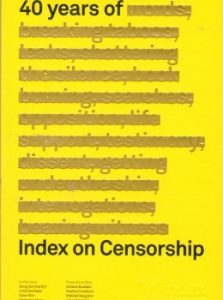
40 years of Index on Censorship March 2012
Grit in the engine, volume 41, issue 1, Spring 2012
Robert McCrum on the 40th anniversary of Index on Censorship. “The success of Index was not a foregone conclusion. Stephen Spender, its founder, was fully alert to the potential for windbaggery and failure. There was, he wrote, ‘the risk that the magazine will become simply a bulletin of frustration’. Actually, the opposite came to pass. Index became a clarion voice in the cause of free expression. The abuses of freedom worldwide in the 1970s were so appalling and so widespread that the magazine rapidly found itself in the frontline of campaigns. Perhaps the most important thing Index did, from the beginning, was to universalise an issue in peril of becoming a special interest: freedom was not ‘a luxury enjoyed by bourgeois individualists’. Along with self-expression, it was a human right, and an instrument of human consciousness.
Read the full article
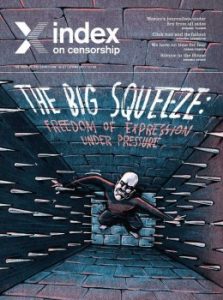
The big squeeze: Index on Censorship magazine Spring 2017
Freedom of expression under pressure, volume 46, issue 1, Spring 2017
The spring 2017 issue of Index on Censorship magazine looks at how pressures on free speech are currently coming from many different angles, not just one. Special features on how to spot fake news, articles from former BBC World Service director Richard Sambrook and former UK attorney general Dominic Grieve, an exclusive interview with the Spanish puppeteer arrested last year, and fiction from award-winning writer Karim Miské.
[/vc_column_text][/vc_column][/vc_row]
8 Oct 2019 | News and features
[vc_row][vc_column][vc_column_text]Badiucao is a Chinese cartoonist whose provocative work has made him persona non grata with the Chinese government. As a result, he currently lives in exile in Australia, although that distance has not stopped him being the target of Chinese authorities.
His bold artwork homes in on the areas the Chinese government would rather not talk about. Tiananmen for example, alongside critical work on the current leader Xi Jinping. And his life is now the subject of a recently released documentary by filmmaker Danny Ben-Moshe, China’s Artful Dissident, which charts the road to an exhibition of his work in Hong Kong. Click here to read about our private screening of the film and our Q&A with Badiucao.
You can help support the artist and free speech more widely by purchasing your own exclusive Badiucao print. All proceeds will go to the artist. If you are interested in purchasing any of the pieces below, please email [email protected]

£350

£350

Sold
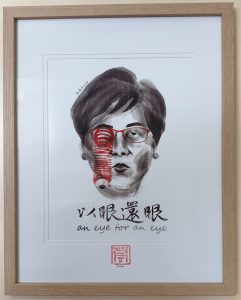
£350

£350
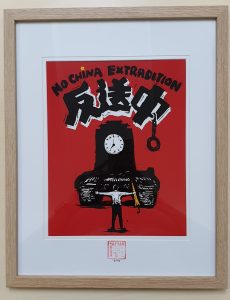
£350
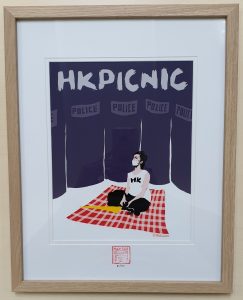
£350

£350
[/vc_column_text][/vc_column][/vc_row]
12 Sep 2019 | Magazine, News and features, Volume 48.03 Autumn 2019
[vc_row][vc_column][vc_custom_heading text=”Editor-in-chief Rachael Jolley argues in the autumn 2019 issue of Index on Censorship magazine that travel restrictions and snooping into your social media at the frontier are new ways of suppressing ideas” google_fonts=”font_family:Libre%20Baskerville%3Aregular%2Citalic%2C700|font_style:400%20italic%3A400%3Aitalic”][vc_column_text]

Border Forces – how barriers to free thought got tough
Travelling to the USA this summer, journalist James Dyer, who writes for Empire magazine, says he was not allowed in until he had been questioned by an immigration official about whether he wrote for those “fake news” outlets.
Also this year, David Mack, deputy director of breaking news at Buzzfeed News, was challenged about the way his organisation covered a story at the US border by an official.
He later received an official apology from the Customs and Border Protection service for being questioned on this subject, which is not on the official list of queries that officers are expected to use.
As we go to press, the UK Foreign Office updated its advice for travellers going between Hong Kong and China warning that their electronic devices could be searched.
This happened a day after a Sky journalist had his belongings, including photos, searched at Beijing airport. US citizen Hugo Castro told Index how he was held for five hours at the USA-Mexico border while his mobile phone, photos and social media were searched.
This kind of behaviour is becoming more widespread globally as nations look to surveil what thoughts we have and what we might be writing or saying before allowing us to pass.
This ends with many people being so worried about the consequences of putting pen to paper that they don’t. They fret so much about being prevented from travelling to see a loved one or a friend, or going on a work trip, that they stop themselves from writing or expressing dissent.
If the world spins further in this direction we will end up with a global climate of fear where we second-guess our desire to write, tweet, speak or protest, by worrying ourselves down a timeline of what might happen next.
So what is the situation today? Border officials in some countries already seek to find out about your sexual orientation via an excursion into your social media presence as part of their decision on whether to allow you in.
Travel advisors who offer LGBT travel advice suggest not giving up your passcodes or passwords to social media accounts. One says that, before travelling, people can look at hiding their social media posts from people they might stay within the destination country. Digital security expert Ela Stapley suggests going further and having an entirely separate “clean” phone for travelling.
These actions at borders have not gone unnoticed by technology providers. The big dating apps are aware that information to be found in their spaces might also prove of interest to immigration officials in some countries.
This summer, Tinder rolled out a feature called Traveller Alert – as Mark Frary reports on – which hides people’s profiles if they are travelling to countries where homosexuality is illegal. Borders are getting bigger, harder and tougher.
It is not just about people travelling, it’s also about knowledge and ideas being stopped. As security services and governments get more tech-savvy, they see more and more ways to keep track of the words that we share. Surely there’s no one left out there who doesn’t realise the messages in their Gmail account are constantly being scanned and collected by Google as the quid pro quo for giving you a free account?
Google is collecting as much information as it can to help it compile a personal profile of everyone who uses it. There’s no doubt that if companies are doing this, governments are thinking about how they can do it too – if they are not already.
And the more they know, the more they can work out what they want to stop.
[/vc_column_text][vc_row_inner][vc_column_inner width=”1/4″][vc_icon icon_fontawesome=”fa fa-quote-left” color=”custom” size=”xl” align=”right” custom_color=”#dd3333″][/vc_column_inner][vc_column_inner width=”3/4″][vc_custom_heading text=”Border officials in some countries already seek to find out about your sexual orientation via an excursion into your social media presence as part of their decision on whether to allow you in” font_container=”tag:h3|text_align:left” google_fonts=”font_family:Libre%20Baskerville%3Aregular%2Citalic%2C700|font_style:400%20italic%3A400%3Aitalic”][/vc_column_inner][/vc_row_inner][vc_column_text]
In democracies such as the UK, police are already experimenting with facial recognition software. Recently, anti-surveillance organisation Big Brother Watch discovered that private shopping centres had quietly started to use facial recognition software without the public being aware.
It feels as though everywhere we look, everyone is capturing more and more information about who we are, and we need to worry about how this is being used.
One way that this information can be used is by border officials, who would like to know everything about you as they consider your arrival. What we’ve learned in putting this special issue together is that we need to be smart, too. Keep an eye on the laws of the country you are travelling to, in case legislation relating to media, communication or even visas change.
Also, have a plan about what you might do if you are stopped at a border. One of the big themes of this magazine over the years is that what happens in one country doesn’t stay in one country. What has become increasingly obvious is that nation copies nations, and leader after leader spots what is going on across the way and thinks: “I could use that too.”
We saw troll factories start in Mexico with attempts to discredit journalists’ reputations five years ago, and now they are widespread. The idea of a national leader speaking directly to the public rather than giving a press conference, and skipping the “need” to answer questions, was popular in Latin America with President Cristina Fernández de Kirchner, of Argentina, and Venezuelan President Hugo Chávez.
A few years later, national leaders around the world have grabbed the idea and run with it. It’s so we don’t have to filter it through the media, say the politicians. While there’s nothing wrong, of course, with having town hall chats with the public, one has a sneaking suspicion that another motivation might be dodging any difficult questions, especially if press conferences then get put on hold. Again, Latin America saw it first.
Given this trend, we can expect that when one nation starts asking for access to your social media accounts before they give you a visa, others are sure to follow. The border issue is broader than this, of course. Migration and immigration are issues all over the world right now, topping most political agendas, along with security and the economy. Therefore, governments are seeking to reduce immigration and restrict who can enter their countries – using a variety of methods.
In the USA and the UK, artists, academics, writers and musicians are finding visas harder to come by. As our US contributing editor, Jan Fox, reports, this has led to an opera singer removing posts from Facebook because she worries about her visa application, and academics self-censoring their ideas in case it limits them from studying or working in the USA. Where does this leave free expression? Less free than it should be, certainly. This is not the only attack on freedom of expression. Making it more difficult for outsiders to travel to these countries means stories about life in Yemen, Syria and Iran, for instance, may not be heard.
We don’t hear firsthand what it is like, and our knowledge shrinks. This policy surely reached a limit when Kareem Abeed, the Syrian producer of an Oscar-nominated documentary about Aleppo, was initially refused a visa to at-tend the Oscar ceremony. Meanwhile, UK festival directors are calling for their government to change its attitude and warn that artists are already excluding the UK from their tours.
One person who knew the value of getting information out beyond the borders of the country he lived in was a former editor of this magazine, Andrew Graham-Yooll, and we honour his work in this issue. His recent death gave us a chance to review his writing for us and for others. A consummate journalist, Graham-Yooll continued to write and report until just weeks before his death, and I know he would have had his typing fingers at the ready for a critique of what is happening in the Argentinian election right now.
Graham-Yooll took the job of editor of Index on Censorship in 1989, after being forced to leave his native Argentina because of his reporting. He had been smuggling out reports of the horrifying things that were happening under the dictatorship, where people who were activists, journalists and critics of the government were “disappearing” – a soft word that means they were being murdered. Some pregnant women were taken prisoner until they gave birth. Their babies were taken from them and given to military or government-friendly families to adopt, while the mothers were drugged and then dropped to their death, from airplanes, at sea.
Many of the appalling details of what happened under the authoritarian dictatorship only became clear after it fell, but Graham-Yooll took measures to smuggle out as many details as he could, to this publication and others, until he and his family were in such danger he was forced to leave Argentina and move to the UK.
Throughout history the powerful have always attempted to suppress information they didn’t want to see the light. We are in yet another era where this is on the rise.
[/vc_column_text][/vc_column][/vc_row][vc_row][vc_column][vc_column_text]
Rachael Jolley is editor-in-chief of Index on Censorship magazine. She tweets @londoninsider. This article is part of the latest edition of Index on Censorship magazine, with its special report on border forces
Index on Censorship’s autumn 2019 issue is entitled Border forces: how barriers to free thought got tough
Look out for the new edition in bookshops, and don’t miss our Index on Censorship podcast, with special guests, on Soundcloud.
[/vc_column_text][/vc_column][/vc_row][vc_row][vc_column width=”1/3″][vc_custom_heading text=”How barriers to free thought got tough” font_container=”tag:h3|text_align:left” link=”url:https%3A%2F%2Fwww.indexoncensorship.org%2F2019%2F09%2Fmagazine-border-forces-how-barriers-to-free-thought-got-tough%2F|||”][vc_column_text]The autumn 2019 Index on Censorship magazine looks at borders round the world and how barriers to free thought got tough[/vc_column_text][/vc_column][vc_column width=”1/3″][vc_row_inner][vc_column_inner][vc_single_image image=”108826″ img_size=”full” onclick=”custom_link” link=”https://www.indexoncensorship.org/2019/09/magazine-border-forces-how-barriers-to-free-thought-got-tough/”][/vc_column_inner][/vc_row_inner][/vc_column][vc_column width=”1/3″][vc_custom_heading text=”Subscribe” font_container=”tag:h3|text_align:left”][vc_row_inner][vc_column_inner][vc_column_text]In print, online. In your mailbox, on your iPad.
Subscription options from £18 or just £1.49 in the App Store for a digital issue.
Every subscriber helps support Index on Censorship’s projects around the world.
 SUBSCRIBE NOW[/vc_column_text][/vc_column_inner][/vc_row_inner][/vc_column][/vc_row]
SUBSCRIBE NOW[/vc_column_text][/vc_column_inner][/vc_row_inner][/vc_column][/vc_row]
12 Sep 2019 | Magazine, Magazine Contents, Volume 48.03 Autumn 2019
[vc_row][vc_column][vc_custom_heading text=”With contributions from Kerry Hudson, Chen Xiwo, Elif Shafak, Meera Selva, Steven Borowiec, Brian Patten and Dean Atta”][/vc_column][/vc_row][vc_row][vc_column][vc_column_text]

Border forces – how barriers to free thought got tough
The autumn 2019 Index on Censorship magazine looks at how borders are getting tougher, journalists are being stopped, visas refused and border officials are snooping into our social media profiles and personal messages. Nations are looking to surveil our thoughts before allowing us to come into their countries and so limiting freedom of expression and the free flow of ideas.
In this issue Steven Borowiec reports from South Korea about how the law means that you can be prosecuted for contacting your relatives in the north without permission; Meera Selva looks at how internet shutdowns are being used round the world to prevent people communicating, most recently in Kashmir; Mark Frary gives tips for LGBT people on how to protect themselves when crossing borders into countries where they might face discrimination. Charlotte Bailey and Jan Fox look at how it is getting tougher in the UK and USA for artists, writers and academics to get visas; and Kaya Genç digs into Turkey’s censorship of the internet. In the rest of the magazine, writers Emilie Pine, Elif Shafak and Kerry Hudson, and theatre director Nicholas Hytner reflect on past famous Index contributors, Václav Havel, Nadine Gordimer, Samuel Beckett and Arthur Miller. We have an extract of the script of the 1977 film Le Camion by Marguerite Duras which has never appeared in English before, and poems by taboo-breaking poet Dean Atta and the Liverpool Poet Brian Patten. We also have an extract of a story by censored Chinese writer Chen Xiwo about a mother and her daughter and their abusive relationship. Plus Index magazine’s first ever crossword by Herbashe.
[/vc_column_text][/vc_column][/vc_row][vc_row][vc_column][vc_custom_heading text=”Special Report: Border forces: how barriers to free thought got tough”][/vc_column][/vc_row][vc_row][vc_column][vc_column_text]Big brother at the border by Rachael Jolley
Switch off, we’re landing! by Kaya Genç Be prepared that if you visit Turkey online access is restricted
Culture can “challenge” disinformation by Irene Caselli Migrants trying to cross the Mediterranean to Europe are often seen as statistics, but artists are trying to tell stories to change that
Lines of duty by Laura Silvia Battaglia It’s tough for journalists to visit Yemen, our reporter talks about how she does it
Locking the gates by Jan Fox Writers, artists, academics and musicians are self-censoring as they worry about getting visas to go to the USA
Reaching for the off switch by Meera Selva Internet shutdowns are growing as nations seek to control public access to information
Hiding your true self by Mark Frary LGBT people face particular discrimination at some international borders
They shall not pass by Stephen Woodman Journalists and activists crossing between Mexico and the USA are being systematically targeted, sometimes sent back by officials using people trafficking laws
“UK border policy damages credibility” by Charlotte Bailey Festival directors say the UK border policy is forcing artists to stop visiting
Ten tips for a safe crossing by Ela Stapley Our digital security expert gives advice on how to keep your information secure at borders
Export laws by Ryan Gallagher China is selling on surveillance technology to the rest of the world
At the world’s toughest border by Steven Borowiec South Koreans face prison for keeping in touch with their North Korean family
Stripsearch by Martin Rowson Bees and herbaceous borders
Inside the silent zone by Silvia Nortes Journalists are being stopped from reporting the disputed north African Western Sahara region
The great news wall of China by Karoline Kan China is spinning its version of the Hong Kong protests to control the news
Kenya: who is watching you? by Wana Udobang Kenyan journalist Catherine Gicheru is worried her country knows everything about her
Top ten states closing their doors to ideas by Mark Frary We look at countries which seek to stop ideas circulating[/vc_column_text][/vc_column][/vc_row][vc_row disable_element=”yes”][vc_column][vc_custom_heading text=”Global View”][vc_column_text]Small victories do count by Jodie Ginsberg The kind of individual support Index gives people living under oppressive regimes is a vital step towards wider change[/vc_column_text][/vc_column][/vc_row][vc_row][vc_column][vc_custom_heading text=”In Focus”][vc_column_text]Germany’s surveillance fears by Cathrin Schaer Thirty years on from the fall of the Berlin wall and the disbanding of the Stasi, Germans worry about who is watching them
Freestyle portraits by Rachael Jolley Cartoonists Kanika Mishra from India, Pedro X Molina from Nicaragua and China’s Badiucao put threats to free expression into pictures
Tackling news stories that journalists aren’t writing by Alison Flood Crime writers Scott Turow, Val McDermid, Massimo Carlotto and Ahmet Altan talk about how the inspiration for their fiction comes from real life stories
Mosul’s new chapter by Omar Mohammed What do students think about the new books arriving at Mosul library, after Isis destroyed the previous building and collection?
The [REDACTED] crossword by Herbashe The first ever Index crossword based on a theme central to the magazine
Cries from the last century and lessons for today by Sally Gimson Nadine Gordimer, Václav Havel, Samuel Beckett and Arthur Miller all wrote for Index. We asked modern day writers Elif Shafak, Kerry Hudson and Emilie Pine plus theatre director Nicholas Hytner why the writing is still relevant
In memory of Andrew Graham-Yooll by Rachael Jolley Remembering the former Index editor who risked his life to report from Argentina during the worst years of the dictatorship[/vc_column_text][/vc_column][/vc_row][vc_row][vc_column][vc_custom_heading text=”Culture”][vc_column_text]Backed into a corner by love by Chen Xiwo A newly translated story by censored Chinese writer about the abusive relationship between a mother and daughter plus an interview with the author
On the road by Marguerite Duras The first English translation of an extract from the screenplay of the 1977 film Le Camion by one of the greatest French writers of the 20th century
Muting young voices by Brian Patten Two poems, one written exclusively for Index, about how the exam culture in schools can destroy creativity by the Liverpool Poet
Finding poetry in trauma by Dean Atta Male rape is still a taboo subject, but very little is off-limits for this award-winning writer from London who has written an exclusive poem for Index[/vc_column_text][/vc_column][/vc_row][vc_row][vc_column][vc_custom_heading text=”Column”][vc_column_text]Index around the world: Tales of the unexpected by Sally Gimson and Lewis Jennings Index has started a new media monitoring project and has been telling folk stories at this summer’s festivals[/vc_column_text][/vc_column][/vc_row][vc_row][vc_column][vc_custom_heading text=”Endnote”][vc_column_text]Endnote: Macho politics drive academic closures by Sally Gimson Academics who teach gender studies are losing their jobs and their funding as populist leaders attack “gender ideology”[/vc_column_text][/vc_column][/vc_row][vc_row][vc_column width=”1/3″][vc_custom_heading text=”Subscribe”][vc_column_text]In print, online, in your mailbox, on your iPad.
Subscription options from £18 or just £1.49 in the App Store for a digital issue.
Every subscriber helps support Index on Censorship’s projects around the world.
 SUBSCRIBE NOW[/vc_column_text][/vc_column][vc_column width=”1/3″][vc_custom_heading text=”Read”][vc_column_text]The playwright Arthur Miller wrote an essay for Index in 1978 entitled The Sin of Power. We reproduce it for the first time on our website and theatre director Nicholas Hytner responds to it in the magazine
SUBSCRIBE NOW[/vc_column_text][/vc_column][vc_column width=”1/3″][vc_custom_heading text=”Read”][vc_column_text]The playwright Arthur Miller wrote an essay for Index in 1978 entitled The Sin of Power. We reproduce it for the first time on our website and theatre director Nicholas Hytner responds to it in the magazine
READ HERE[/vc_column_text][/vc_column][vc_column width=”1/3″][vc_custom_heading text=”Listen”][vc_column_text]In the Index on Censorship autumn 2019 podcast, we focus on how travel restrictions at borders are limiting the flow of free thought and ideas. Lewis Jennings and Sally Gimson talk to trans woman and activist Peppermint; San Diego photojournalist Ariana Drehsler and Index’s South Korean correspondent Steven Borowiec
LISTEN HERE[/vc_column_text][/vc_column][/vc_row]

















